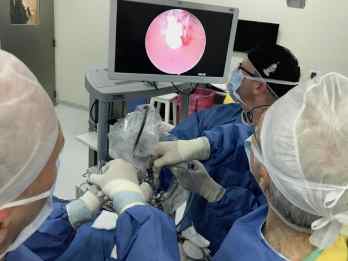Highly complex care centers

The Care Centers where we provide our healthcare have specialized areas and services for specific, patient-centered medical care for pediatric patients.
The Care Centers where we provide our healthcare have specialized areas and services for specific, patient-centered medical care for pediatric patients.
They have the highest level of technology for better diagnosis and treatment of complex brain and spinal cord pathologies. Their equipment includes:
- 3 Tesla MRI: advanced equipment that allows for better definition and a more precise diagnosis.
- Intraoperative CT: in specific cases, it allows us to monitor the outcome of a surgery during the procedure, without leaving the operating room.
- Intraoperative ultrasound and fluoroscopy: allows for real-time evaluation of the surgical area of interest.
- Intraoperative brain and spinal neurophysiology: allows for monitoring brain and spinal cord activity during surgery.
- 3 Tesla MRI with tractography and functional brain mapping of motor, sensory, and language, with image fusion. This study is entered into the neuronavigator and shows which areas should not be touched during surgery.
- Functional brain mapping: creates a map of the eloquent areas during surgery so they can be preserved
- Neuronavigation: a computerized system that reproduces three-dimensional images of the brain and is used by the neurosurgeon to plan the best route to a specific pathology.
- High-magnification and high-resolution neurosurgical microscope: allows for surgery under high magnification and illumination, obtaining better results.
- Ultrasonic tumor cavitator: an instrument that allows tumors to be removed more easily.
- Neuroendoscope: a small tube with its own light and camera that projects a magnified image of the surgical area on a monitor and allows us to perform minimally invasive surgeries.
- Frameless stereotaxy (VarioGuide system): allows for biopsies and access to small areas deep in the brain with greater Precision
- TransPortal Surgery with EndoPorts: Expands the scope, allowing access to deep brain lesions with less damage to normal tissue
Patologías
- Tumores cerebrales
- Tumores de columna y médula espinal
- Tumores craneales
- Tumores de órbita
- Tumores de hipófisis
- Hidrocefalia
- Quistes aracnoideos
- Malformación de Chiari
- Malformaciones congénitas del cerebro y columna
- Defectos del cierre del tubo neural
- Sindromes craneofaciales
- Craneosinostosis
- Epilepsia
- Espasticidad, movimientos anormales y parálisis cerebral
- Patología vascular
- Traumatismo encéfalo-craneal
- Traumatismo de columna
- Infecciones cerebrales y de columna



